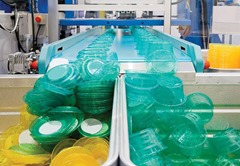Packaging waste: a recovery success story
 By recovering almost 80 per cent of packaging waste, Ireland has exceeded its EU Directive targets with the help of the producer responsibility concept.
By recovering almost 80 per cent of packaging waste, Ireland has exceeded its EU Directive targets with the help of the producer responsibility concept.
In contrast to other items, virtually all packaging material eventually becomes waste, resulting in a vast amount entering the Irish waste management system each year. In 2011, the last year for which statistics are available, 863,597 tonnes of packaging waste was managed, of which a large majority (682,280 tonnes or 79 per cent) was diverted from landfill.
This compares well with the 60 per cent recovery target for 2011 set down in the EU’s Packaging Directive. The Environmental Protection Agency estimates that all recovered paper, cardboard, glass, plastic, ferrous and aluminium packaging was recovered, as was most of 92.8 per cent of recovered wood. Landfill rates were still high in the packaging waste streams for textiles (100 per cent), aluminium (61.2 per cent) and plastics (52.5 per cent).
European policy has been a major driver for change in packaging waste policy. The first Directive, in 1985, covered the packaging of beverage containers intended for human consumption but lacked detail and was poorly implemented.
The current Packaging Directive (94/62/EC) was passed in 1994 and set the context for Ireland’s Waste Management Act 1996. This legislation created an over-arching obligation on agriculture, commerce and industry to prevent or minimise the production of waste and allowed for producer responsibility obligations which would manage individual waste streams.
Indeed, the Government prefers that a business sector develops its own proposals and takes action voluntarily rather than imposing controls and obligations through legislation. In this way, a sector can devise producer responsibility schemes that are sensitive to both commercial and environmental requirements.
Repak, for example, was established by IBEC in 1997 for large producers (with turnovers of €1 million or more) handling large quantities (10 tonnes or more) of packaging waste. Producers include manufacturers, retailers and the transport and storage companies that connect the various parts of the supply chain.
The scheme charges a levy on its member companies, which rises with the amount of waste produced and is then used to pay for the collection and recycling of this waste stream. Its member companies account for around 60 per cent of packaging waste. While Repak is the only packaging compliance scheme in the State, other companies can self-comply and submit reports to local authorities. In 2011, 139 self-complying companies were registered for this purpose.
Where an initiative is not taken forward, the Minister for the Environment can introduce mandatory obligations under the 1996 Act. He can also introduce legal obligations which support the objectives of voluntary schemes. The packaging waste scheme is backed up by the Waste Management (Packaging) Regulations 2007 which mainly came into effect in March 2008 and aim to meet Ireland’s European obligations in this area of waste policy.





